FP243 – That Which Remains: a Blackhall Tale, Part 2 of 3
Welcome to Flash Pulp, episode two hundred and forty-three.
![]() Tonight we present, That Which Remains: a Blackhall Tale, Part 2 of 3.
Tonight we present, That Which Remains: a Blackhall Tale, Part 2 of 3.
(Part 1 – Part 2 – Part 3)
[audio:http://traffic.libsyn.com/skinner/FlashPulp243.mp3]Download MP3
(RSS / iTunes)
This week’s episodes are brought to you by Gatecast.
Flash Pulp is an experiment in broadcasting fresh pulp stories in the modern age – three to ten minutes of fiction brought to you Monday, Wednesday and Friday evenings.
Tonight, Thomas Blackhall, master frontiersman and student of the occult, finds himself at the bedside of an ailing man with a vulgar tale to tell.
That Which Remains: a Blackhall Tale, Part 2 of 3
Written by J.R.D. Skinner
Art and Narration by Opopanax
and Audio produced by Jessica May
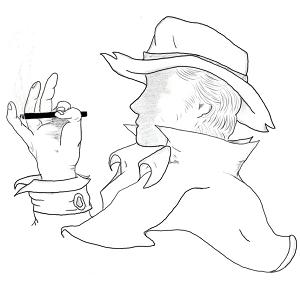 They’d hired a quiet driver from the edge of town, and the lad’s thick-furred mutt paced the sleigh as the trio slid beyond the settlements. As the sun crept through the sky, the trees grew close to the path, so that their their heavy branches sometimes left a snowy residue on the blanket which Wesley Shea was using as a refuge from the cold.
They’d hired a quiet driver from the edge of town, and the lad’s thick-furred mutt paced the sleigh as the trio slid beyond the settlements. As the sun crept through the sky, the trees grew close to the path, so that their their heavy branches sometimes left a snowy residue on the blanket which Wesley Shea was using as a refuge from the cold.
The fingerless man was quick to accept the generous figure Blackhall had suggested as payment for the service of his company, and guidance in locating Ethan Wright, but Shea knew well enough that he would have taken on the work simply for the opportunity to once again travel beyond the town limits.
Since the exchange, Thomas had sat largely mute, unable to break the pathfinder’s habit of contemplating the terrain against the chance of a future navigation.
At noon, however, Blackhall produced a small pot pie from his sack, and, upon determining that the boy with the reigns was uninterested in a share, split it in two. Acting carefully, so as not to lose any of the spiced beef within, he handed a chilled half across Shea, who pinched it in his palms.
“I collected this at dawn, as the baker pulled its steaming form from the Bucking Pony’s oven,” said Thomas, “I suspect we were well away before Fitzhugh’s hound had even risen from his bunk.”
Shea nodded as he chewed, then swallowed, so that he might reply.
“Are we on a lark then, as an excuse to avoid the Captain’s summons?” he asked. “It appears, to me, to be a costly method of shirking labour, but I once knew a fellow who sold his prolific orchard to escape the work of picking it.”
“No, as I have said, it’s a serious enough matter,” said Blackhall, ”you implied yourself that your friend was ailing.”
“Then, I must ask, to what end am I truly here?
“I am no physician, and my directions will be no different than those I presented at our departure. If Ethan should not be at hand at our arrival, I’ve certainly no sway with Mrs. Wright to lend you credence. In truth, my crass humoured company will keep the woman at a respectable orbit, as she has conclusively stated in the past. Finally, I have heard tell of your reputation, and I certainly do not have the fortitude to fend off the spirits of the deceased, nor men who stalk the moonlight as wolves.”
“You are here for protection,” replied Thomas.
Shea’s brow grew tight. “Given the saber at your side, and the Baker rifle amongst your luggage, I can only assume you meant your comment as a jape at myself. Do you mean my own protection? What might befall me back in town? It is my perception, sir, that I am more at risk in this moving crib, or in reach of Mother Wright’s rolling pin, than I was while toasting in the lodgings of my friends and family.”
Blackhall retrieved a small flask from his gear, and, after a quick nip, passed it across.
His companion’s disposition improved dramatically at the smell of whiskey.
For a moment, the sounds of the world were reduced to the snorting of the mares, and the scrape of the sleigh’s runners over the snow, then Thomas made his response.
“Perhaps – but, as an aside, what is your issue with the woman of the house? I understand the loneliness of separation, be it due to illness or geography, but I find it hard to condone the tale, as you told it, of her husband’s tryst among the pines. He may have had many mouths to feed, but it was she who was tending them while he supposedly took his pleasure.”
“It’s not for a gentleman to speak of cleanly buried history,” said Shea, “but mayhaps there was a time, well before the loss of my fingers, when two gents of a certain look could cut quite a swath across this ample frontier of farmers’ lamb-eyed daughters.”
With their appetites for both discussion and lunch sated, they fell into a silence which remained until they halted at the shoulder-wide lane that marked their destination.
Their welcome was a cold one, as had been expected, and Mrs. Wright offered no pleasantries as she led the pair beyond the sheeting which she’d erected to screen her husband’s degrading condition. Blackhall reckoned it a flimsy defense against the gaggle of children who otherwise filled out the cabin with flailing limbs and shouted demands, but it was obvious she was making the best of limited resources.
“You look like you fell from a horse’s ass,” Shea told his friend, once introductions were conveyed, and they’d been left in relative privacy.
Ethan Wright’s pale face was the only flesh visible above the envelope of knitted wool in which he rested. His hair hung in greasy black strings about his face, and it seemed as if he had made little effort to shave since his encounter in the swamp.
“She let you in as a punishment, you know,” he replied, “I was adamant that no visitors be admitted, however much coin they might owe me.”
Shea smiled at the retort, but Blackhall thought he heard a spine of annoyance in the comment. The ill man’s delivery was too hushed to be sure of either interpretation.
Ducking close to the invalid’s ear, Thomas began a whispered conversation.
“Your wife likely thinks you’ve finally dipped your wick in a poisoned pot, but I suspect it’s actually your mind that has taken on a rotting illness. Is it not so?”
From so near a vantage point, the stains of un-dried tears were plainly visible on the unkempt pillow.
Wright nodded.
“I’ve heard a version of the tale,” Blackhall continued, “but I do not put much faith in the chatter of your comrades. If I am to help, I must hear the truth of the thing, but I am sure that neither your friends’ jovial position, nor your wife’s accusatory stance, are the reality of the situation. I have read of cases similar to yours – and of the trauma associated with such a visitation. Though I am but a stranger, I ask that you accept mine as a sympathetic ear, and that you provide me with the genuine details, so that I might assist you in finding some respite.”
Ethan wept as he spoke, but, though he maintained a concerned expression, Shea made no effort to better hear the muffled explanation.
“I’ve a small cabin in the swamp, at which I maintain some stores to ease my toil on the hunt. I’d intended on a short excursion, but the game were in a skittish mood, and I’d managed no result at the close of the first day. It’s a quiet place – I’d never encountered another person amongst the weeping willows and cattails. It’s usually only brother bear whose company I must keep watch for.
“Under such lonely circumstances I can hardly be blamed for supping on a bit of scotch.
“There was a woman in the room when I awoke, and I was still beneath my bed of tanned furs as she approached. It was apparent, from her lack of clothing, that the entirety of her body was gray as stone, but she otherwise held the appearance of humanity.
“There was a time, as you may have heard, when I behaved as a scoundrel. I’ll gladly swear on anything you’d like to stack beneath my hand, however, that there was naught in my mind, at that immodest discovery, but my own beloved wife and the scamps we’ve raised together.
“Despite my considerations, I could feel a great helplessness within myself. While my thoughts increasingly screamed, my jaw remained stiff. While my chest increasingly ached with repulsion, there was nothing I could do but spectate her approach. It was as if I were a mewing babe, pinned in place by a smothering pillow.
“She purred to herself as she pulled away my coverings, and sighed happily when she – once she was done removing my shroud.
“There was no lust in my heart – there was no desire in my body – and yet I could not prevent the reaction I presented.
“Her weight, and warmth, was on me then. Though I struggled with every muscle, I could summon no resistance but whimpering. As I sobbed endlessly, she only giggled; giggled and surged.
“So began my week of hell.”
Flash Pulp is presented by http://skinner.fm, and is released under the Canadian Creative Commons Attribution-Noncommercial 2.5 License.
Freesound.org credits:
Text and audio commentaries can be sent to skinner@skinner.fm, or the voicemail line at (206) 338-2792 – but be aware that it may appear in the FlashCast.
– and thanks to you, for reading. If you enjoyed the story, tell your friends.
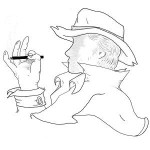 Thomas Blackhall had been working hard to avoid the puffy-faced private dogging his steps around the icicle-laden settlement of Perth. The frontiersman’s first tactic had been to simply leave with no indication as to his destination, and two-days hunting along a river sheltered by drooping pines had provided him with a formidable store of venison, but it was not enough to put off the messenger.
Thomas Blackhall had been working hard to avoid the puffy-faced private dogging his steps around the icicle-laden settlement of Perth. The frontiersman’s first tactic had been to simply leave with no indication as to his destination, and two-days hunting along a river sheltered by drooping pines had provided him with a formidable store of venison, but it was not enough to put off the messenger. Mr. Baldy’s first instinct seemed to be to follow the sheriff into the apartment building, but, in a rare of fit of reason, he instead turned to me and asked what I thought we should do.
Mr. Baldy’s first instinct seemed to be to follow the sheriff into the apartment building, but, in a rare of fit of reason, he instead turned to me and asked what I thought we should do. “You, sir, have the intelligence of a lobotomized chimp with a penchant for model glue,” I informed Mr Baldy.
“You, sir, have the intelligence of a lobotomized chimp with a penchant for model glue,” I informed Mr Baldy.
 Having a toddler in the cab of the truck considerably lightened our moods – although, I will admit, it may have also been the fact that her lack of desire to murder us was proof that there was an antidote for the sickness.
Having a toddler in the cab of the truck considerably lightened our moods – although, I will admit, it may have also been the fact that her lack of desire to murder us was proof that there was an antidote for the sickness.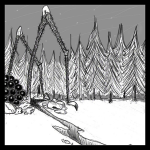 “I’ve never driven like that in my life,” was all he could deliver between sobs.
“I’ve never driven like that in my life,” was all he could deliver between sobs.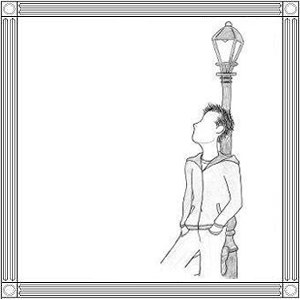 Mulligan Smith was lost in a sea of cheap jackets and bulky winter coats.
Mulligan Smith was lost in a sea of cheap jackets and bulky winter coats.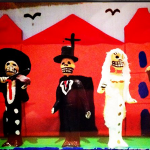 Daytime traffic had long drained away, and the Konitzer Bridge, a span over Capital City’s Lethe River, stood empty but for the trio of late night pedestrians beneath its gray iron-struts.
Daytime traffic had long drained away, and the Konitzer Bridge, a span over Capital City’s Lethe River, stood empty but for the trio of late night pedestrians beneath its gray iron-struts.